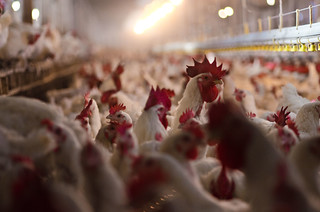
Georgia ranks as the top poultry-producing state in the nation with Oglethorpe County being ranked 6th in poultry and egg production statewide. Because of the concentration in size and location of poultry flocks in commercial production, producers must practice daily biosecurity protocols and develop best management practices for their farms. If you’re a poultry farmer reading this article, I’m about to be “preaching to the choir” as they say. This article is geared more toward neighbors and friends of our poultry farmers. As a community, we should also understand risks and how we can help our farm owners maintain biosecurity.
Avian Influenza is a viral disease of domestic and wild birds that can be of low pathogenicity causing only mild disease or highly pathogenic causing severe illness and death of entire flocks. Although not a current threat to food safety or human health in Georgia, Avian Influenza could quickly become a major threat to our state’s number one industry. Biosecurity, in the farming community, refers to strategies and management protocols that lessen biological risk. Farmers and visitors should be implementing practices that minimize the introduction and spread of diseases such as Avian Influenza.
Sanitation is paramount to protecting poultry and livestock farms from biological risk. Farm employees and visitors should wear clothing washed with detergents and bleach since last exposure to birds. Equipment used at more than one location should be thoroughly cleaned in between, including truck tires. Employees should be provided boot washes for entry and exit of houses. Poultry growers should avoid all contact with non-commercial sources of poultry including backyard flocks or poultry shows. Non-commercial flocks are seldom vaccinated for major poultry diseases that can be devastating to commercial production. Wild game birds carry Avian Influenza viruses so hunters should take the same biosecurity precautions before entering a poultry farm. Farmers should not allow their employees to own backyard flocks and neighbors should be informed of the urgency of getting any unhealthy backyard birds to a diagnostic lab as soon as possible.
Visitors should be kept at a minimum on poultry farms. When a visitor is necessary, growers should provide protective coverings for boots, coveralls, and headgear if there has been recent contact with other birds. Friends, please don’t stop in for an unannounced visit to a poultry farm if you have a backyard flock at home. In addition to humans and equipment, animals are known to be carriers of disease organisms. Dogs, cats, mice, rats, and free-flying birds all contribute some level of risk. Insects such as flies, beetles, and mosquitoes are also known to be carriers of microbes. Keep grass and weeds cut around poultry houses and remove old equipment or trash. Dead animals should be dealt with promptly with an approved disposal method.
Highly Pathogenic Avian Influenza (HPAI) has such great potential to devastate farming that it is considered Internationally a reportable disease. State and federal surveillance programs monitor the occurrence of avian influenza in domestic poultry and wild birds on an ongoing basis. Signs of HPAI include sudden death, lack of energy or appetite, decreased egg production, soft-shelled or misshapen eggs, and swelling or discoloration of the head, eyelid, or comb. Other signs include nasal discharge, coughing, sneezing, lack of coordination, and diarrhea. Report any observation of potential HPAI to the Georgia Department of Agriculture Avian Influenza Hotline at 770.766.6850.
Increased biosecurity practices have been helping. USDA Animal and Plant Health Inspection Service (APHIS) reported fewer AI cases in 2023 than in 2022 nationwide. The decrease in cases is credited to a combination of less virus in the environment and improved biosecurity measures by the industry. Vigorous surveillance and increased awareness have been commonplace for most poultry producers in recent years.
Farm biosecurity should be taken seriously by everyone. By being proactive in our community, we can protect the poultry industry around us. As always, call our office with any questions at 706-743-8341.